|
Andrea Avena
double bass
|

|
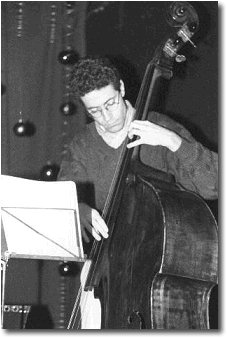 Andrea Avena
was born in Rome, Italy on February 25th 1965, and began his instrumental and musical studies tutored by
Andrea Pighi and Massimo Morriconi (electric bass and double bass), by
Bruno Tommaso (double bass, harmony, composition and arranging principles), and
Giancarlo Gazzani (arranging for big band ensambles). Andrea Avena
was born in Rome, Italy on February 25th 1965, and began his instrumental and musical studies tutored by
Andrea Pighi and Massimo Morriconi (electric bass and double bass), by
Bruno Tommaso (double bass, harmony, composition and arranging principles), and
Giancarlo Gazzani (arranging for big band ensambles).
In 1986 he wins a contest sponsored both by
ISMEZ and by the the Third Channel of the National Public Broadcasting TV channel
RAI, as best emerging new talent in the electric bass and double bass
category. In the same year he participates to the Roccella Ionica International Music
Festival, playing in the "New Talents
Orchestra" directed by
Paolo Damiani.
He collaborates with Bruno Tommaso during the experimental orchestra clinics held at
Siena Jazz in the 1988
and 1990
editions.
Avena has been a selected finalist at the Barga International Contest
For The Jazz Orchestral Arranging And Composition, in the 1988,
1989,
1990 and
1996; moreover, he was also a finalist at the international contest
"Scrivere in Jazz" held in Sassari in
1998.
In 1989 he founded the
"Andrea Avena Group"
(F.Barresi vocals, S.Micarelli guitar, F.Pieroni piano,
A.Fabbri drums), with which he records a record and tours several jazz events.
I
n 1990, as a member of the
"Silent Circus" jazz group, he performs at the
Siena Jazz Festival, and as a member of the jazz group "Tetracolors", he wins first prize at the Forlì New Jazz Groups' contest.
I
n
1991 and
1992 he performs, as part of
Lelio Luttazzi's Trio, in TMC's (a nationally broadcasted television channel) television show
"Buon Compleanno".
Throughout the following years, he collaborates with numerous jazz musicians, such as
Lester Bowie, Kirk Lightsey, Manhu Roche, Don Moye,
Massimo Urbani, Maurizio Giammarco, Antonello Salis,
Michele Rabbia, Massimo Manzi.
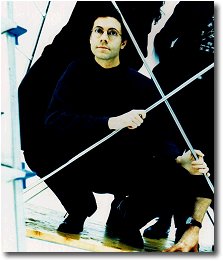 In
1993 he takes part to
Francesca Breschi's theater production "Cundu Luna
Vini" (directed by David Riondino
and conducted by Germano Mazzocchetti). In the same year he begins his long and active collaboration with Academy Award winner composer
Nicola Piovani, performing in his theater productions "Canti Di
Scena", "Il Signor
Novecento", "Le Cantate Del Fiore E Del
Buffo" and "Concerto
Fotogramma" (music by
Nicola Piovani, book by Academy Award winner Vincenzo Cerami). In
1993 he takes part to
Francesca Breschi's theater production "Cundu Luna
Vini" (directed by David Riondino
and conducted by Germano Mazzocchetti). In the same year he begins his long and active collaboration with Academy Award winner composer
Nicola Piovani, performing in his theater productions "Canti Di
Scena", "Il Signor
Novecento", "Le Cantate Del Fiore E Del
Buffo" and "Concerto
Fotogramma" (music by
Nicola Piovani, book by Academy Award winner Vincenzo Cerami).
In 1994, as a member of
Francesco Santucci's big band, he participates to several festivals and musical events, among which
"Umbria Jazz". Avena also begins his collaboration with french guitarist
Philippe Roche, with whom, along with drummer Tommy Caggiani, he forms the
"Hoggar Trio", a group which favors workin on a sort of musical contamination between jazz and arabian music, using ethnical instruments of north african origin, such as the Algerine instrument Oud .
In 1995 he forms, along with
Roberto Spadoni, Paolo Sorge
and Giovanni Lo Cascio, the "Aporia" quartet, a group which basically focuses upon the relationship between music and images: this ensamble creates and performs live rare french documentaries dating back from the '20
("Anémic Cinema" by Marcel Duchamp,
"Le Ballet Mécanique" by Fernard Legér,
"L'Etoile De Mer" by Man Ray,
"Charleston" by Jean Renoir ) as well as a short feature by Buster Keaton
("Sherlock Junior").
On the same year he collaborates with the theater company "Compagnia Della
Rancia", playing in the orchestra of the italian version of the musical "West Side Story", conducted by
M° Richard Parrinello.
1995
was also the year in which Avena began his collaboration with the
"M. J. Urkestra" big band, conducted by
R. Spadoni, in which, aside from playing double bass, he also arranges both his own compositions, and several Charles Mingus' tracks.
He also participates, with a personal elaboration of a famous Christmas carol, to a twinship with the Udine Municipal Orchestra (December
1996).
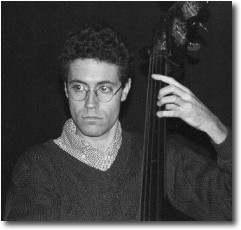 On April
1998 the orchestra's first CD has been released; it was dedicated to Charles Mingus. On the summer of
1998, the orchestra begins recording the
"Estrela Da Tarde" project, an Andrea Avena composition for voice and orchestra, putting poems by Pablo Neruda and Manuel Bandeira to music. On April
1998 the orchestra's first CD has been released; it was dedicated to Charles Mingus. On the summer of
1998, the orchestra begins recording the
"Estrela Da Tarde" project, an Andrea Avena composition for voice and orchestra, putting poems by Pablo Neruda and Manuel Bandeira to music.
In 1999 the orchestra prepares a tribute to
Duke Ellington, which has been aired live representing italian National Radio Broadcasting Network Radiotre, during the european radios' day celebrating Ellington.
In 1997 and
1998 he performs in the italian version of the musical
"Irma La Douce", directed by
Antonio Calenda, touring all of Italy.
In 1999 he performs with
Paolo Pietrangeli, a well known songwriter, during the presentation of his latest CD.
In the same year he performs in Bethlehem, on the Holy Friday Easter celebration, as part of the orchestra conducted by
Nicola Piovani, playing "La Pietà", a sort of modern day Stabat
Mater, composed by M° Piovani himself with a book and lyrics by Vincenzo
Cerami, acted by Luigi Proietti, and sung by soprano Rita Cammarano
and gospel singer Amii Stewart.
To further his theatrical experiences, Avena performs in "Maria
Maddalena", (lyrics by
Andrea Camilleri, based on a book by Marguerite Yourcenar) in "Echelmessia", by
Ennio De Concini, and moreover he composes the soundtrack for the monologue
"Il Custode", by
Antonio Lauro, performed by Paolo Triestino.
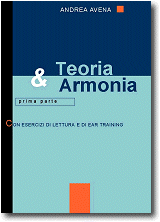 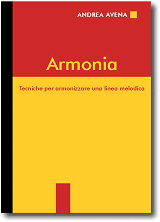 On the month of March of the year
2000, conducted by
Gunther Schuller as a part of the "Terza Corrente
Ensamble", he performs music by Alec Wilder and Eric Dolphy, some of which as a world premiere, along with special guest performances by
Gianluigi Trovesi and Paolo Ravaglia. On the month of March of the year
2000, conducted by
Gunther Schuller as a part of the "Terza Corrente
Ensamble", he performs music by Alec Wilder and Eric Dolphy, some of which as a world premiere, along with special guest performances by
Gianluigi Trovesi and Paolo Ravaglia.
As a double bass player since 1983, he has recorded numerous theater, television and movie soundtracks, collaborating with composers such as
Nicola Piovani, Germano Mazzocchetti, Giovanna Marini, Franco
Piersanti, Renato Serio, Piero Pintucci, Stelvio
Cipriani, and many more.
For over ten years, from 1990 to the year
2000, he has been Head of the
Music Theory Department at Rome's Music University, in which he also taught Theory, Modern Harmony, Arranging and double bass: Avena has also taught double bass and electric bass at
Terni's Jazz University.
Andrea Avena is the author of an innovative method for the learning of theory, harmony and music reading, developed in two volumes; he also wrote a book about modern harmony.
"TETRACOLORS" Tetracolors [Philology, W 63-2]
"MASSIMO SANTANTONIO QUINTET, featuring Antonello Salis" [Nimes, nim 70114]
"MINGUS" M. J. Urkestra (dir.
R.
Spadoni ) [Splasc(h) Records, CDH 653.2]
"ESTRELA DA TARDE" F. Barresi-M.J.Urkestra (dir. R. Spadoni) [in uscita]
"LIVE" Umberto Sangiovanni [Dna, NACD 11205-2]
"ÙRKESTRA" M. J. Urkestra [Splasc(h) Records, CDH 739.2]
"SCRIPT" Massimo Santantonio [Acuoustic Music Records, 1233]
Audio Samples:
|
PITHECANTHROPUS E ALTRE
STORIE
|
ESTRELA DA TARDE
|
|
Clima preistorico
(Andrea Avena)
 (680 KB) (680 KB)
Pithecanthropus erectus
2
(Charles Mingus)  (550 KB) (550 KB)
Philippe Noiret
 (880 KB) (880 KB)
(music: A. Avena;
lyrics: F. Barresi)
Fabrizia Barresi vocal
Stefano Micarelli guitar
Fabrizio Pieroni piano
Andrea Avena double bass
Alessandro Fabbri
drums
|
Como você se
chama?
(Andrea Avena)  (1.5
MB) (1.5
MB)
Quiero tus manos en mis ojos
 (1.5 MB) (1.5 MB)
(music: A. Avena; lyrics: P. Neruda)
M.J.URKESTRA
director: Roberto Spadoni
sax: Daniele Tittarelli, Marco Falsini, Alessandro Tomei, Milena Angelé, Piero Quarta
trumpeth: Franco Santodonato, Antonello Sorrentino, Andrea Pandolfo, Marcello Ercolani
trombone: Aldo Iosue, Davide Rossini, Palmiro Del Brocco, Rosario Liberti
guitar: Paolo Sorge
piano: Fabrizio Pieroni
double bass: Andrea Avena
drums: Massimo D'Agostino
vocal: Fabrizia Barresi
|
For contacts and
information:
Andrea Avena
email: andreaavena@mclink.it
web:
www.andreaavena.com
On
Vitaminic:
http://stage.vitaminic.it/andrea_avena
This page has 6.889 hits
Last Modified Date: 04/08/2003

|
|

